Top 10 Wake Forest news stories of 2013
 The announcement that Gwen Ifill would be delivering Wake Forest's 2013 Commencement address was the No. 10 most-viewed story of the year. Find out what other nine stories were hits .
The announcement that Gwen Ifill would be delivering Wake Forest's 2013 Commencement address was the No. 10 most-viewed story of the year. Find out what other nine stories were hits .Categories: Alumni, Campus Life, Experiential Learning, Happening at Wake, Research & Discovery, University Announcements

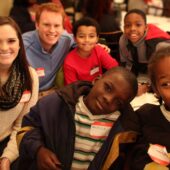 Erin Hellmann ('14) and Logan Healy-Tuke ('14) founded The Ashley Explorers Saturday Academy to strengthen the reading and math skills of elementary students in Winston-Salem.
Erin Hellmann ('14) and Logan Healy-Tuke ('14) founded The Ashley Explorers Saturday Academy to strengthen the reading and math skills of elementary students in Winston-Salem. 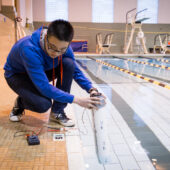 Sophomore Yinger 'Eagle' Jin has come up with a way to turn waves in the Reynolds gym pool into electricity. The mathematical formulas he developed could one day be used to help calculate the amount of electricity that could be produced through wave energy off the North Carolina coast.
Sophomore Yinger 'Eagle' Jin has come up with a way to turn waves in the Reynolds gym pool into electricity. The mathematical formulas he developed could one day be used to help calculate the amount of electricity that could be produced through wave energy off the North Carolina coast. 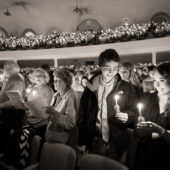 Christmas decorations, music, and the smell of sweet coffee filled Wait Chapel as more than 2,000 students, faculty, staff, alums and friends of the University gathered to celebrate the 49th annual Lovefeast.
Christmas decorations, music, and the smell of sweet coffee filled Wait Chapel as more than 2,000 students, faculty, staff, alums and friends of the University gathered to celebrate the 49th annual Lovefeast.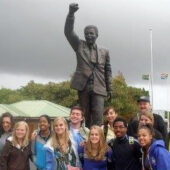 Wake Forest students, alumni, faculty and staff remember Nelson Mandela, an icon of freedom who embodied the spirit of Pro Humanitate, and reflect upon his influence on their own lives.
Wake Forest students, alumni, faculty and staff remember Nelson Mandela, an icon of freedom who embodied the spirit of Pro Humanitate, and reflect upon his influence on their own lives.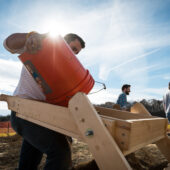 Carrying shovels, screens and other equipment, 12 students trekked across a tobacco field along the Yadkin River to reach an archaeological site where they began finding artifacts more than 500 years old.
Carrying shovels, screens and other equipment, 12 students trekked across a tobacco field along the Yadkin River to reach an archaeological site where they began finding artifacts more than 500 years old. 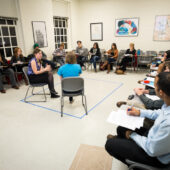 The theatre and counseling departments have partnered, through an IPLACe-funded initiative led by Phil Clarke and Sharon Andrews, so undergraduate theatre students can sharpen their improvisational acting and counseling students can gain realistic counseling experience.
The theatre and counseling departments have partnered, through an IPLACe-funded initiative led by Phil Clarke and Sharon Andrews, so undergraduate theatre students can sharpen their improvisational acting and counseling students can gain realistic counseling experience.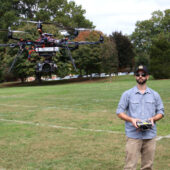 A flying, insect-like robot built and tested by biology graduate student Max Messinger and a team of WFU researchers will give an unprecedented look at Peru’s tropical cloud forest, one of the world’s most biodiverse ecosystems and a key indicator of global climate change.
A flying, insect-like robot built and tested by biology graduate student Max Messinger and a team of WFU researchers will give an unprecedented look at Peru’s tropical cloud forest, one of the world’s most biodiverse ecosystems and a key indicator of global climate change. If you’re taking the SAT and you’re not positive you know the correct answer, do you skip or guess? Previous studies suggest that your strategy may be very different from that of the student sitting next to you. A faculty-student research team in economics is looking for answers.
If you’re taking the SAT and you’re not positive you know the correct answer, do you skip or guess? Previous studies suggest that your strategy may be very different from that of the student sitting next to you. A faculty-student research team in economics is looking for answers. Biology professor Kathy Kron and the 11 students enrolled in Biology 105: Plants & People met at Reynolda House Museum of American Art to learn firsthand how biology is incorporated in the current exhibition, “Things Wondrous and Humble: American Still Life."
Biology professor Kathy Kron and the 11 students enrolled in Biology 105: Plants & People met at Reynolda House Museum of American Art to learn firsthand how biology is incorporated in the current exhibition, “Things Wondrous and Humble: American Still Life."